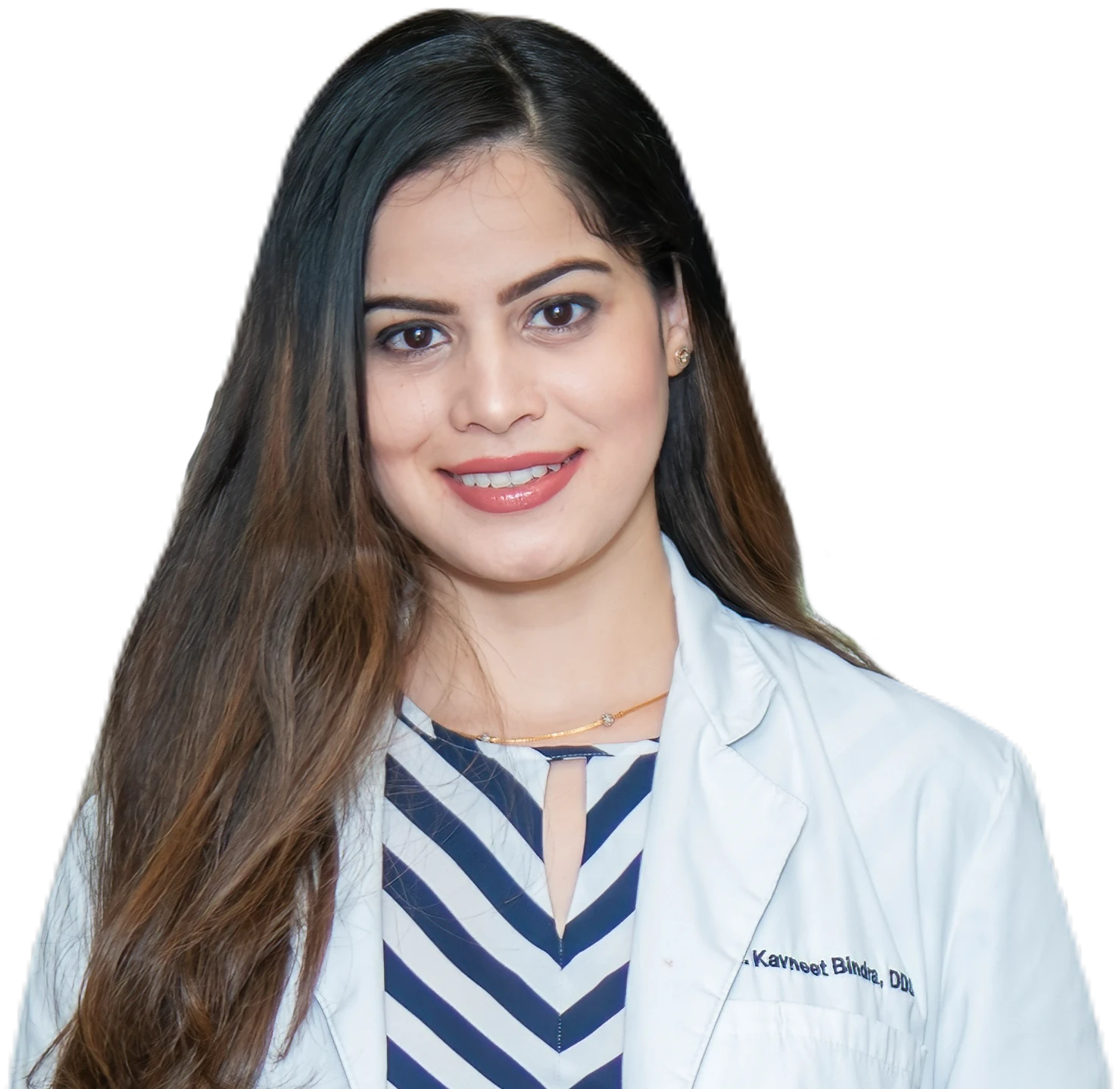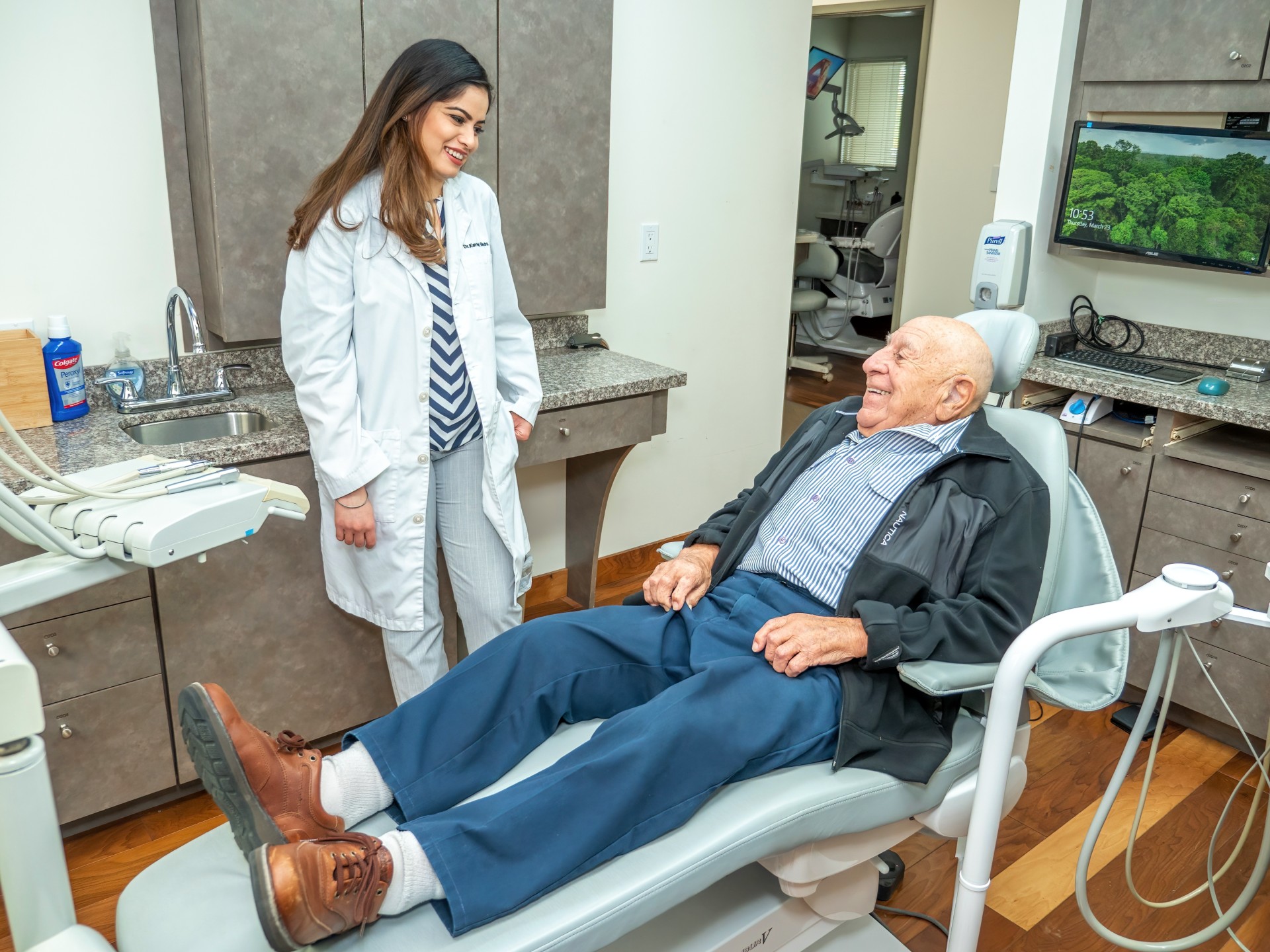Crestview Family Dental offers dental extraction appointments to help get you out of pain and on with your life! Our experienced team is dedicated to ensuring a comfortable experience for all our patients.
Tooth extractions may be necessary if you are experiencing:
Dr. Bindra always strives to preserve and restore the natural structure of your teeth. However, extensive disease, decay, or trauma may lead to a medically necessary tooth extraction. If you’re experiencing any of the above symptoms, we recommend giving us a call at (408) 217-0727 or you can request your appointment online right away. Dr. Bindra will provide her expert opinion and discuss all potential treatment options for your unique case.

I am a gentle, compassionate, and confident practitioner who takes pride in possessing excellent communication skills to help patients who have dental fear and anxiety. It is said, “A smile is a curve that sets everything straight.” My goal as your doctor is to build your smile and confidence by providing professional and thorough dental care. I am committed to using state-of-the-art technology and taking continuing education courses to deliver the best dentistry to you.
I received my Bachelor of Science in biochemistry from the University of the Pacific in Stockton, and then went on to receive my dental degree from the University of the Pacific, Arthur A. Dugoni School of Dentistry in San Francisco. I received extensive training in all aspects of general dentistry including managing kids, special needs and elderly patients.
I am an active member of the American Dental Association (ADA), California Dental Association (CDA), and Santa Clara county dental society.
In my free time, I like to spend time with my family, explore new restaurants, travel to different places , and I enjoy zumba classes.
We do most extractions right here in our office, helping you avoid the extra time and costs associated with a referral.

Patient Focused Care | We look out for your best interest and let your goals guide our process.
Modern Technology | We utilize the latest advancements in dental technology to treat patients more effectively and in fewer visits, saving you time and money.
Comprehensive Pre and Post-Operative Care | You’ll receive a customized treatment plan and detailed pre/post operative instructions to help ensure a smooth recovery.
Pain Management | We offer a variety of sedation options to decrease pain or anxiety, including IV sedation.
Transparent Pricing | You’ll feel comfortable knowing exactly how much your procedure will cost. We also offer financing options!
Need to see a tooth extraction specialist in your area but don’t have insurance? Not a problem! Patients who would like to break their treatment costs into affordable monthly payments can benefit from working with a financing company. Applying for financing is quick and easy, and you’ll receive an instant decision so you can proceed with your treatment promptly.
If you’re interested in seeing a tooth extraction dentist but don’t have insurance, call Crestview Family Dental today at (408) 217-0727 to speak with our insurance coordinator who can provide more information about our financing options.
We accept most PPO plans, and our treatment coordinator will be able to provide an estimate of what your plan may cover. We’re also happy to bill your dental insurance plan on your behalf to help you maximize your benefits.
While it may be scary to hear that you need a tooth pulled, our compassionate dental team uses gentle techniques, modern technology, and anxiety-reducing sedatives. This ensures that our patients experience a pain-free extraction with minimal risk of complications.
The first step in the removal process is to tell Dr. Bindra if you’ll require anxiety-reducing sedatives, such as oral sedatives. If so, she will write you a prescription for an oral sedative that you must pick up at a pharmacy of your choosing and take before your appointment.
Next, Dr. Bindra will administer local anesthesia to numb the extraction site. Once you are relaxed and sufficiently numb, Dr. Bindra will skillfully remove the damaged tooth. Teeth extractions can be completed very quickly and painlessly.
After your tooth has been removed, we will either pack the extraction site with gauze or close the wound with a few, small stitches. At this point, our dental team will monitor you to ensure that the sedatives are wearing off before letting a friend or family member drive you home.
In most cases, a tooth extraction is used only as a last resort if other restorative dental procedures are unsuccessful. Common reasons why you might need a tooth pulled include:
At Crestview Family Dental, our team prioritizes your health. Therefore, we will only recommend a tooth extraction if we have exhausted all other options. For some patients, tooth removal may be the best solution to improve their quality of life and save their oral health.
At Crestview Family Dental, we will also discuss the ways we can replace the tooth before moving forward. Dental implants, bridges, or dentures, may be good options for replacing the missing tooth and we will be sure to discuss the benefits of each of them as we figure out the best choice for you moving forward to restore your smile!
In general, tooth extractions are very safe. However, there are some cases in which a patient should disclose past medical history to our dental team to ensure patient safety. For example, we need to know if you have:
If you have any of these conditions, please let our dental team know immediately. Knowing this information will help us mitigate complications, ensuring a safe and successful extraction.
Proper aftercare is extremely important following an extraction. To reduce the risk of infection and improve recovery:
Once the wound is fully healed, patients have a wide variety of tooth-replacement options to choose from, such as dental implants, bridges, or dentures. It is essential to replace a missing tooth to prevent damage to other teeth from biting forces/uneven pressure, avoid tilting or shifting of remaining teeth into the gap.
While our immediate concern is the short-term management of your care, we will also discuss your long-term plans for replacing missing teeth. Leaving a space is always an option, but spaces in your smile can create appearance and function challenges that are important to consider. Teeth slowly shift or migrate into open spaces and minimizing the effects of an unbalanced bite now can prevent issues later in life.
You’ve come to the right place! Give Crestview Family Dental a call or book your appointment online today to see how we can help with your extraction needs. Our friendly dental team will perform an oral evaluation and discuss all of your options with you. If an extraction is necessary, your doctor will perform the procedure with your comfort in mind, going the extra mile to limit any pain.
We’re here to help! At Crestview Family Dental, we understand the urgency associated with emergency tooth extractions. As such, we keep open slots for emergency dental appointments. Give us a call or request your appointment online right away. We do our best to reply at all times of the day!
Give Crestview Family Dental a call ASAP! Prompt dental care for an emergency tooth extraction is crucial to prevent further damage or complications. We keep open slots for emergency dental appointments so give us a call or request your appointment online right away. We do our best to reply at all times of the day!
The time it takes for a tooth extraction to heal can vary depending on a variety of factors, such as the type of extraction, the location of the tooth, and your overall health. In general, it can take anywhere from a few days to a few weeks for the extraction site to fully heal.
Here are the typical healing stages for a tooth extraction:
During the healing process, it’s important to follow your doctor’s instructions carefully. Some things to avoid include smoking, eating hard foods, and strenuous activity. You may also be prescribed medications and/or antibiotics to help manage any discomfort or prevent infection.
If you experience any severe pain, bleeding, or other complications after a tooth extraction, contact our office immediately.
After a tooth extraction, it’s important to be careful with what you eat and drink to prevent complications and promote healing. Here are some recommendations for what to eat and drink after a tooth extraction:
It’s important to follow your doctor’s instructions carefully and avoid any foods or drinks that could interfere with healing or cause discomfort. If you experience severe pain or any other complications after a tooth extraction, contact our office immediately.
Proper care after a tooth extraction can help promote healing and prevent complications. Here are some general guidelines for tooth extraction aftercare:
It’s important to follow your post-op instructions carefully and attend any follow-up appointments as scheduled to ensure proper healing and prevent complications.
You may experience some discomfort during a tooth extraction, but we will typically use local anesthesia to numb the area to minimize pain during the procedure.
After the extraction, you may experience some pain, swelling, and discomfort for a few days, but these symptoms can usually be managed with medication if necessary.
A tooth extraction should not be an excessively painful procedure, and our friendly dental team will take steps to help minimize pain and discomfort before, during, and after the procedure. It’s important to follow your doctor’s instructions carefully and attend any follow-up appointments as scheduled to ensure proper healing and prevent complications.
There are several benefits of getting a dental implant after a tooth extraction:
Dental implants offer a variety of benefits for individuals who have lost one or more teeth due to injury, decay, or other factors. It’s important to discuss your options with Dr. Bindra to determine whether dental implants are the right choice for your individual needs and dental health.
Removing a wisdom tooth can provide several benefits for your dental health, including:
Overall, removing wisdom teeth can help improve your dental health and prevent a variety of dental problems. If you’re considering having your wisdom teeth removed, give us a call or request your consultation with Dr. Bindra online today!
Of course! At Crestview Family Dental, we understand the urgency associated with emergency wisdom tooth extractions. As such, we keep open slots for emergency dental appointments. Give us a call or request your appointment online right away. We do our best to reply at all times of the day!
We can see you as soon as today!
We can see you as soon as TODAY!
We’ll never share your info with anyone